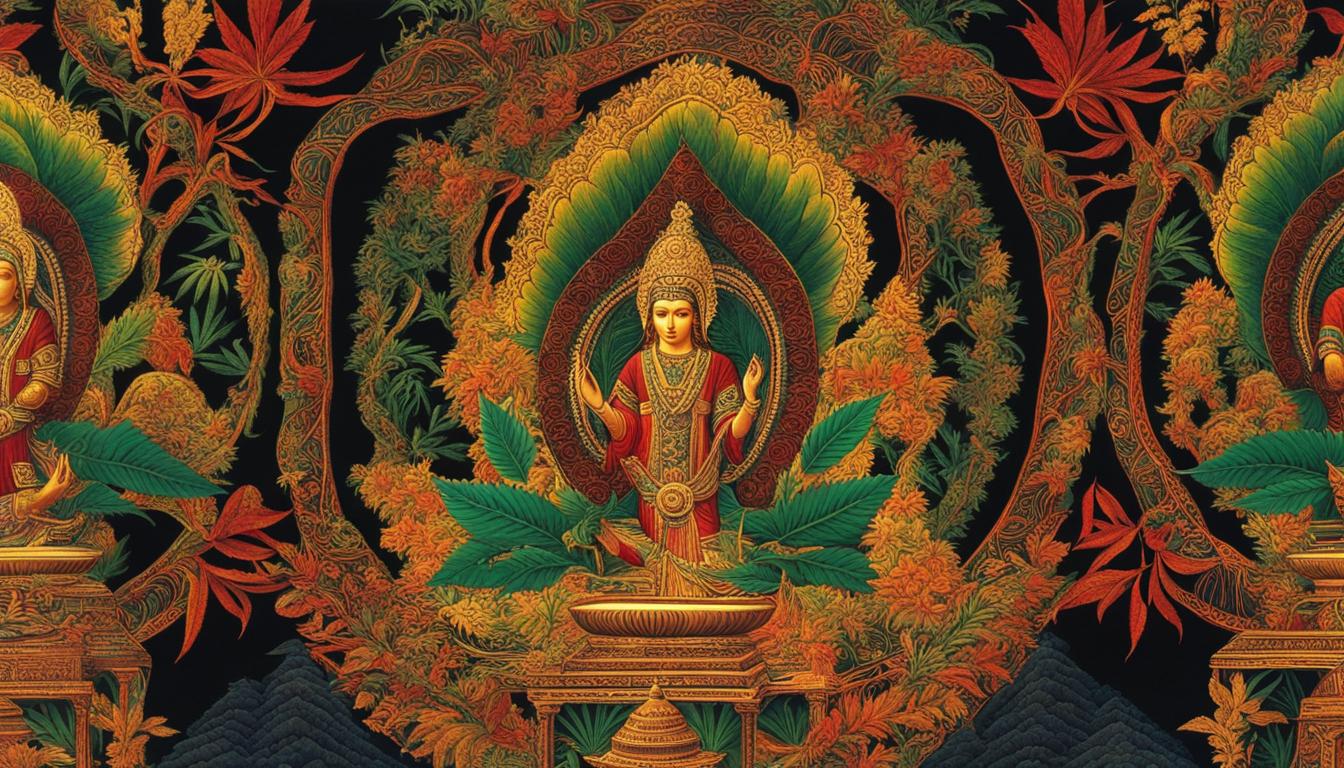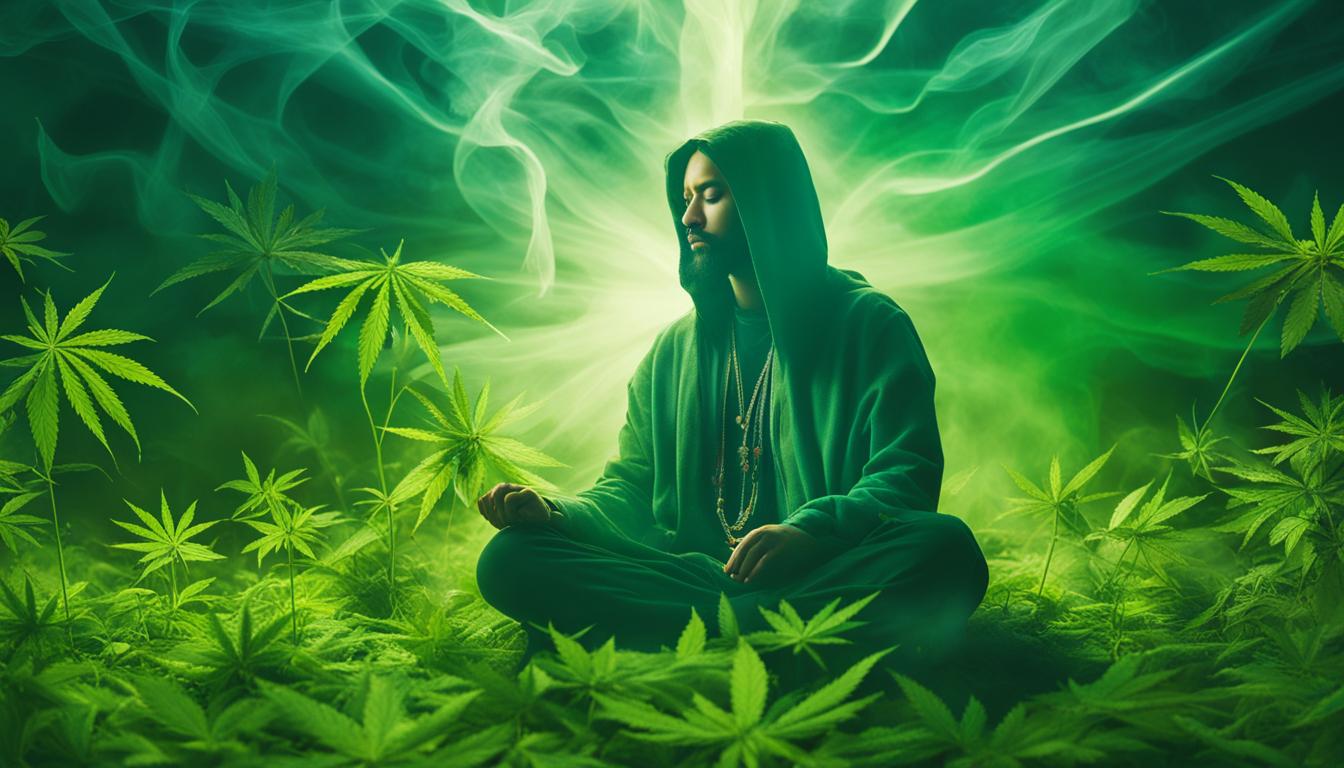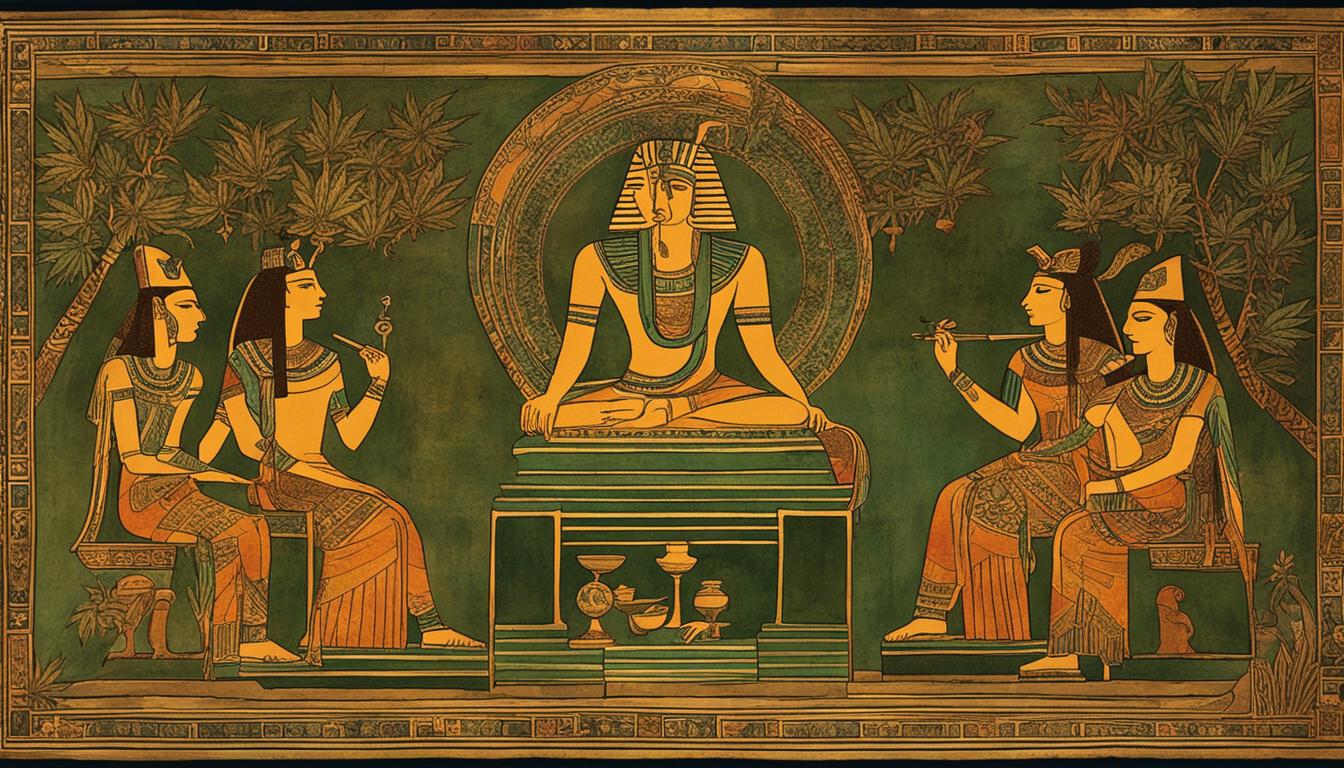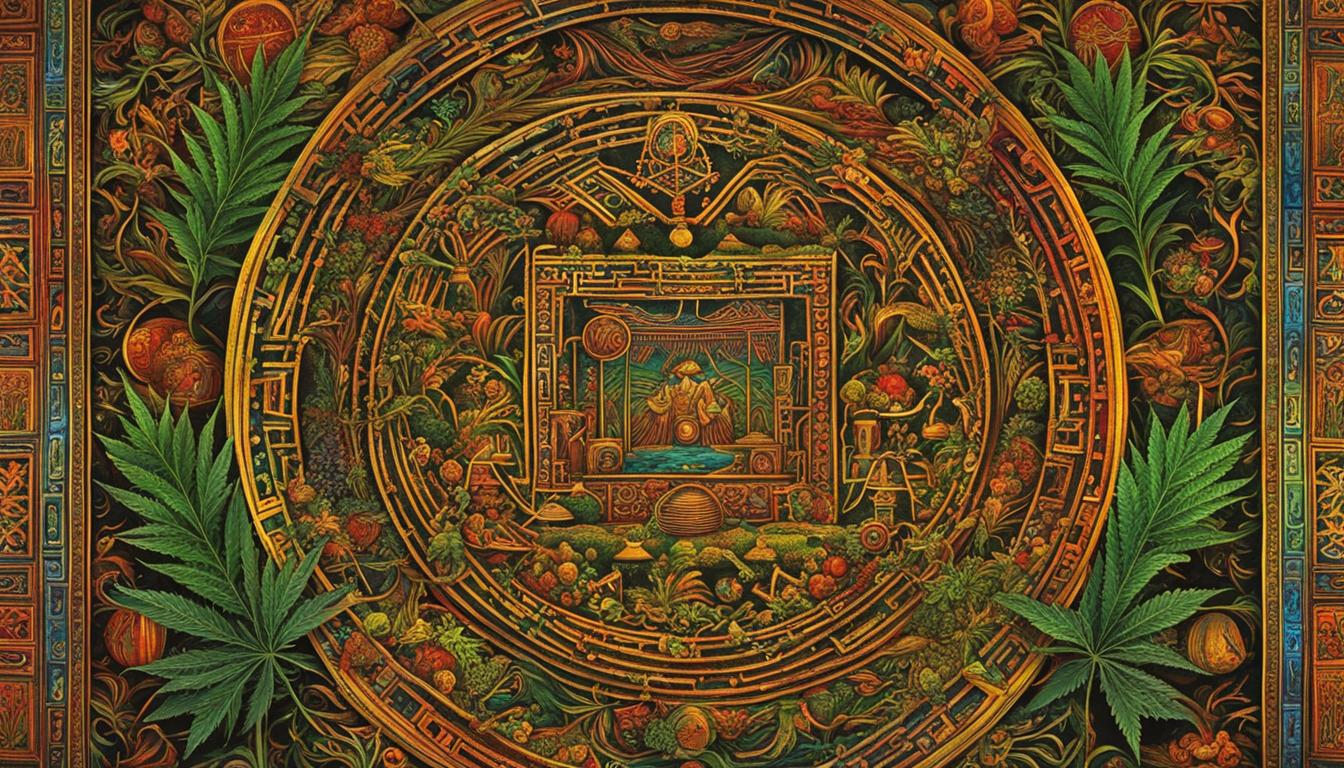What Were the Ancient Religious and Spiritual Uses of Cannabis?
Welcome to our exploration of the fascinating history of cannabis in ancient religion and spirituality. In this article, we will delve into the ancient civilizations that valued and incorporated cannabis into their religious practices, ceremonies, and rituals. From the Indian subcontinent to the Middle East, cannabis held a sacred place in the hearts and minds of ancient cultures.
Let us embark on a journey through time and discover the profound significance of cannabis in ancient religious traditions. We will uncover the ancient rituals, festivals, and ceremonies where cannabis was revered as a sacred plant, enhancing spiritual experiences and fostering a deeper connection with the divine.
Join us as we explore the rich tapestry of history and spirituality, and unveil the hidden treasures of cannabis in ancient times. Together, let’s unlock the wisdom and insights that can be gleaned from the ancient religious and spiritual uses of this remarkable plant.
Cannabis in Ancient Egypt and the Middle East
In the ancient civilizations of Egypt and the Middle East, cannabis held great religious significance and was used in various rituals and ceremonies. The use of cannabis in these cultures dates back thousands of years and is supported by archaeological evidence and historical texts.
A notable example of cannabis use in Ancient Egypt is the mention of hempseed oil in the Ebers papyrus, a medical document from around 1550 BCE. The oil was used to treat vaginal inflammation, highlighting the medicinal properties of cannabis in the region. Additionally, cannabis pollen has been found in the tomb of Ramses II, suggesting that it was used during religious ceremonies or funerary rites.
The civilizations of Assyria, Egypt, and the Hebrews obtained cannabis from Aryan cultures and incorporated it into their religious practices. Cannabis was used as incense and likely played a role in enhancing spiritual experiences. Its use as an entheogen, a substance used to induce spiritual experiences, demonstrates the religious significance attached to cannabis in these ancient cultures.
| Ancient Egypt | Ancient Middle East |
|---|---|
| Cannabis used medicinally | Aryan cultures supplied cannabis |
| Cannabis pollen found in Ramses II’s tomb | Cannabis used as incense |
| Religious ceremonies and rituals | Enhanced spiritual experiences |
The use of cannabis in Ancient Egypt and the Middle East reflects the intertwining of spirituality and ancient cultures. Cannabis played a significant role in religious ceremonies and rituals, serving as a conduit for spiritual experiences and enhancing the connection between worshippers and the divine.
As we delve into the history of cannabis in spirituality, it becomes evident that its use was not limited to a specific region or culture. From ancient Egypt to the Middle East, cannabis was revered as a sacred plant with the power to elevate and deepen spiritual experiences. Understanding the religious significance of cannabis in these ancient civilizations provides us with insights into the profound relationship between humans, plants, and the divine.
Cannabis in Shamanic and Pagan Cultures
In ancient times, cannabis held a significant role in the religious and spiritual practices of shamanic and pagan cultures. These cultures recognized cannabis as a sacred plant with the power to induce deep contemplation, spiritual enlightenment, and introspection. It was often consumed to explore the depths of the human mind and subconscious, allowing individuals to tap into higher states of consciousness.
Within these traditions, cannabis was not only used for spiritual purposes but also played a role in rituals and orgies. It was believed to enhance connection, pleasure, and spiritual experiences, particularly in relation to fertility and sexuality. Greek mythology references a powerful substance that eliminated anguish and sorrow, which is thought to be related to the use of cannabis and its ability to induce euphoria and alleviate emotional distress.
Accounts from Herodotus describe ceremonial practices by the Scythians, where cannabis seeds were burned and the smoke was ingested for its energizing and mind-altering effects. The Germanic paganism also associated cannabis with the Norse love goddess, Freya. These examples highlight the widespread use of cannabis in various ancient shamanic and pagan cultures, indicating its integral role in their spiritual and religious practices.
The Spiritual Significance of Cannabis in Ancient Times
“Cannabis has long been considered a sacred plant, revered for its ability to expand consciousness and facilitate spiritual experiences. Ancient shamanic and pagan cultures recognized its profound impact on the mind, using it to explore the depths of their spirituality. Through the consumption of cannabis, individuals sought enlightenment, deep contemplation, and a harmonious connection with the divine.”
| Shamanic and Pagan Cultures | Key Beliefs and Practices |
|---|---|
| Scythians | Burning cannabis seeds in rituals |
| Greek Mythology | Reference to a powerful substance eliminating anguish and sorrow |
| Germanic Paganism | Association of cannabis with the Norse love goddess, Freya |

The spiritual significance of cannabis in ancient times cannot be overlooked. It served as a tool for introspection, enlightenment, and a deeper understanding of the self and the universe. While the specific rituals and practices varied between cultures, the common thread was the recognition of cannabis as a sacred plant with immense spiritual potential.
Cannabis in Buddhism
Buddhism has had a complex relationship with cannabis throughout history. The Fifth Precept, which advises against the consumption of intoxicating drinks and drugs, is often interpreted as discouraging the use of cannabis. However, Buddhist scriptures offer differing views on the matter. Some interpretations suggest that cannabis can be used for medicinal purposes, while others emphasize the importance of abstaining from any mind-altering substances.
In Mahayana Buddhism, the use of cannabis is seen as potentially beneficial if it aids in meditation and helps practitioners achieve a deeper understanding of themselves and the universe. It is believed that cannabis can facilitate introspection and contemplation, allowing individuals to explore their own consciousness and reach higher levels of spiritual awareness.
Within Vajrayana Buddhism, a branch of Mahayana, the use of cannabis is often encouraged in certain Tantric practices. Cannabis is believed to heighten sensory perception, increase focus, and enhance spiritual experiences. It is used in rituals and ceremonies to facilitate a deeper connection with the divine and promote feelings of transcendence.
Spiritual Practices Involving Cannabis in Buddhism
- Some Buddhist sects prescribe the use of cannabis for medicinal purposes
- Use of cannabis in meditation to achieve a deeper understanding of the self and universe
- Cannabis is encouraged in certain Tantric practices to enhance spiritual experiences
It is important to note that the use of cannabis in Buddhism is not universally accepted or practiced. Different Buddhist traditions may have varying views on cannabis, and individual practitioners may choose to interpret the teachings according to their own beliefs and understanding.
As Buddhism continues to evolve and adapt to different cultures and times, its relationship with cannabis remains a subject of exploration and discussion.
| Buddhist Tradition | Views on Cannabis |
|---|---|
| Mahayana Buddhism | ✔ Allowed if aids in meditation and spiritual understanding |
| Vajrayana Buddhism | ✔ Encouraged in Tantric practices for enhanced spiritual experiences |
| Other Buddhist Traditions | ❌ Discouraged due to the Fifth Precept and interpretations against drug use |
Cannabis in Christianity
Cannabis has a long history of association with ancient spiritual traditions, including within the context of Christianity. In ancient times, cannabis played a significant role in the religious ceremonies and rituals of early Christians. The use of cannabis was intertwined with their spiritual traditions, providing a means of deepening their connection with the divine.
One notable mention of cannabis in Christianity can be found in the Old Testament of the Bible. The “holy anointing oil” described in Exodus 30:23-25, contains cannabis as one of its main ingredients. This anointing oil was used for sacred purposes, such as consecrating priests and anointing objects in the service of God. It is believed that the cannabis in the anointing oil played a role in enhancing spiritual experiences and facilitating communication with the divine.
However, over time, the use of cannabis in Christian rituals and ceremonies diminished. Various factors, including cultural shifts and changing societal norms, contributed to the decline of cannabis in mainstream Christian practices. Today, the use of cannabis is not widely practiced in modern Christian traditions. However, it is worth noting that there are still some Christian sects and individuals who incorporate cannabis into their spiritual practices, drawing inspiration from the ancient traditions within Christianity.
Table: Cannabis Use in Ancient Christian Traditions
| Time Period | Christianity and Cannabis |
|---|---|
| Ancient Times | Cannabis was used in religious ceremonies and rituals, including the anointing of holy objects. |
| Medieval Period | The use of cannabis in Christian practices declined, influenced by changing cultural and societal norms. |
| Modern Era | While not widely practiced, there are still some Christian sects and individuals who incorporate cannabis into their spiritual traditions. |
While cannabis may no longer hold a prominent place in mainstream Christian practices, its historical significance within the faith cannot be denied. The exploration of cannabis in ancient spiritual traditions, including Christianity, not only sheds light on the diverse practices of different cultures but also invites us to reflect on the evolving nature of religious beliefs and practices over time.
Cannabis in Other Ancient Traditions
In addition to the ancient religious and spiritual practices discussed earlier, cannabis has also played a significant role in various other ancient traditions.
Many modern religious movements, such as Rastafarianism, consider cannabis to be a sacred herb. Rastafarians believe that cannabis brings spiritual enlightenment and connects them to a higher power. It is used in rituals and ceremonies as a means of achieving spiritual clarity and unity.
Another philosophy that explores the spiritual nature of cannabis use is Cantheism. Cantheists view cannabis as a tool for religious and spiritual exploration. They believe that cannabis can enhance one’s connection with the divine and promote self-reflection and personal growth.
The Dacians and Scythians, ancient cultures located in Eastern Europe and Central Asia, had their own traditions involving cannabis. They would burn cannabis seeds and inhale the smoke as part of their religious practices. The smoke was believed to have transformative and purifying properties, helping individuals connect with the spiritual realm.
“Cannabis has the power to open minds and hearts, allowing us to connect with the divine in new and profound ways.” – Cantheism
The Role of Cannabis in Ancient Traditions
Throughout history, cannabis has been valued for its spiritual and mystical properties. It has been used as a tool for meditation, introspection, and religious ceremonies. The use of cannabis in ancient traditions highlights its status as a sacred plant that can facilitate spiritual experiences and connection with the divine.
| Ancient Tradition | Use of Cannabis |
|---|---|
| Rastafarianism | Cannabis is considered a sacred herb and used in rituals for spiritual enlightenment. |
| Cantheism | Cannabis is seen as a tool for religious and spiritual exploration, promoting self-reflection and personal growth. |
| Dacians and Scythians | Cannabis seeds were burned and the smoke inhaled as part of religious practices to connect with the spiritual realm. |
Conclusion
Cannabis, a sacred plant with a rich history, has played a significant role in spirituality throughout ancient civilizations. From the Indian subcontinent to the Middle East, cannabis was revered for its ability to enhance spiritual experiences and was used in ceremonies, rituals, and festivals. Its religious significance and profound impact on ancient cultures cannot be ignored.
Although the use of cannabis in spirituality has diminished in some religious traditions over time, its historical and cultural importance remains. The exploration and discussion of cannabis in modern religious movements continue to shape our understanding of its spiritual potential.
Cannabis as a sacred plant has left an indelible mark on human history. Its role in religious practices and its connection to the divine have captivated cultures throughout time. As we delve deeper into the history of cannabis in spirituality, we gain a greater appreciation for its profound influence on ancient civilizations and its enduring significance in our quest for spiritual enlightenment.
FAQ
What were the ancient religious and spiritual uses of cannabis?
Cannabis was used in various ancient civilizations for religious ceremonies, rituals, and festivals. It held religious significance and was seen as a sacred plant with the ability to enhance spiritual experiences.
How was cannabis used in ancient Egypt and the Middle East?
Cannabis was used for medicinal and spiritual purposes in ancient Egypt. It was mentioned in the Ebers papyrus as a treatment for vaginal inflammation, and cannabis pollen has been found in the tomb of Ramses II. The Assyrians, Egyptians, and Hebrews obtained cannabis from Aryan cultures and used it as incense. Cannabis oil was likely used throughout the Middle East for centuries.
How was cannabis used in shamanic and pagan cultures?
Cannabis was used by shamanic and pagan cultures to ponder deeply philosophical and religious subjects, achieve enlightenment, and explore the depths of the human mind and subconscious. It was also used as an aphrodisiac during rituals and orgies.
What is the perspective of Buddhism on cannabis use?
Buddhism has varying views on cannabis use. The Fifth Precept, which prohibits intoxicating drinks and drugs, is often interpreted as a refrain from cannabis use. However, some interpretations of Buddhist scriptures prescribe the use of cannabis for medicinal purposes. The use of cannabis is seen as beneficial in certain Tantric practices.
How was cannabis used in Christianity?
Cannabis was used in ancient Christianity, particularly in rituals and ceremonies. The “holy anointing oil” mentioned in the Old Testament contained cannabis as one of its main ingredients. However, its use in Christianity has diminished over time and is not widely practiced in modern Christian rituals.
How was cannabis used in other ancient traditions?
In Rastafarianism, cannabis is considered a sacred herb and is used in spiritual rituals. Cantheism explores the religious nature of the interaction between humans and cannabis. Other ancient traditions, such as the Dacians and Scythians, had traditions of burning cannabis seeds and inhaling the smoke.
What is the significance of cannabis in ancient religious and spiritual practices?
Cannabis had a rich history in religious and spiritual practices. It was used in ceremonies, rituals, and festivals, and was seen as a sacred plant with the ability to enhance spiritual experiences. While its use has diminished in some religious traditions over time, its historical and cultural impact cannot be ignored.














